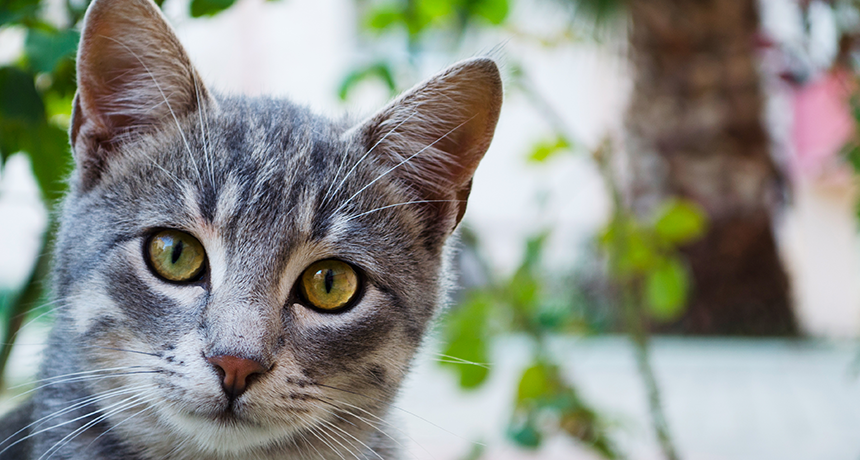Yes, cats know their own names
They could pick out their names when called, a new study shows

You called? Cats can recognize the sound of their own names, a new study shows. But that doesn’t mean they will come, sit or fetch.
denozy/iStock/Getty Images Plus
Share this:
- Share via email (Opens in new window) Email
- Click to share on Facebook (Opens in new window) Facebook
- Click to share on X (Opens in new window) X
- Click to share on Pinterest (Opens in new window) Pinterest
- Click to share on Reddit (Opens in new window) Reddit
- Share to Google Classroom (Opens in new window) Google Classroom
- Click to print (Opens in new window) Print
Move over Fido. Dogs aren’t the only pets that can take a hint from humans. Cats can tell the difference between the sound of their names and other similar words, a new study finds. Good kitties.
Scientists have already studied how dogs respond to people’s behavior and speech. But researchers are just scratching the surface of human-cat interactions. Domestic cats (Felis catus) do appear to respond to the expressions on people’s faces. Cats can also distinguish between different human voices. But can cats recognize their own names?
“I think many cat owners feel that cats know their names, or the word ‘food,’” says Atsuko Saito. But there was no scientific evidence to back up cat lovers’ hunches. Saito is a psychologist — someone who studies the mind — at Sophia University in Tokyo. She’s also a cat owner to a male mouser named “Okara,” which means soy fiber or tofu scraps in Japanese.
So Saito and her colleagues pounced on that research question. They asked the owners of 77 cats to say four nouns of similar length followed by the cat’s name. Cats gradually lost interest with each random noun. But when the owner said a cat’s name, the feline reacted strongly. They moved their ears, head or tail, shifted their hind paw position. And, of course, they meowed.
The results were similar when cats lived alone or with other cats. Even cats at a cat café — where customers can hang out with many cats — responded to their names. The name didn’t have to come from a beloved owner, either. When a non-owner said the name, cats still responded to their names more than to other nouns. The scientists published their findings April 4 in Scientific Reports.
One finding did give the team pause. Cats living at cat cafés almost always reacted to their names and those of other cats living there. Housecats did so much less often. Maybe that’s because cat cafés have so many cats in residence, the researchers speculate. Cats at these cafés don’t just bond with a single owner or a family. Lots of humans visit the cafés, so the cats hear their names from many unfamiliar and familiar voices. A cat living at a café may also frequently hear its name called at the same time as another cat’s. So it may be harder for cats to associate their own names with positive events (such as attention and treats) in these environments. For their next step, the researchers hope to figure out whether cats recognize the names of their feline housemates as well as their own names
These findings mean that cats join the ranks of animals that have shown some sort of response in experiments to the names people give them. Those animals include dogs, dolphins, apes and parrots. It’s hard to compare across species, though. Some dogs, for example, can tell the difference between hundreds of human words (not that it’s a contest or anything). But dog studies usually involve command and fetch tests. Cats might respond to their names, but not many cats can be bothered to fetch.
The study makes a strong case that cats are purr-fectly capable of recognizing their own names. Getting a treat or cuddles as a reward is part of how cats learn to recognize a name. However, owners may also use their cat’s name in a negative setting, like yelling at Fluffy to get off the stove. As a result, cats can probably learn to associate these familiar utterances with good and bad experiences, Saito notes. And that might not be great for cat-human relations. So only using a cat’s name in a positive context and using a different term in a negative context could help cats and humans communicate more clearly.
So cats may recognize their names. But will they come when called? Don’t get your hopes up.






